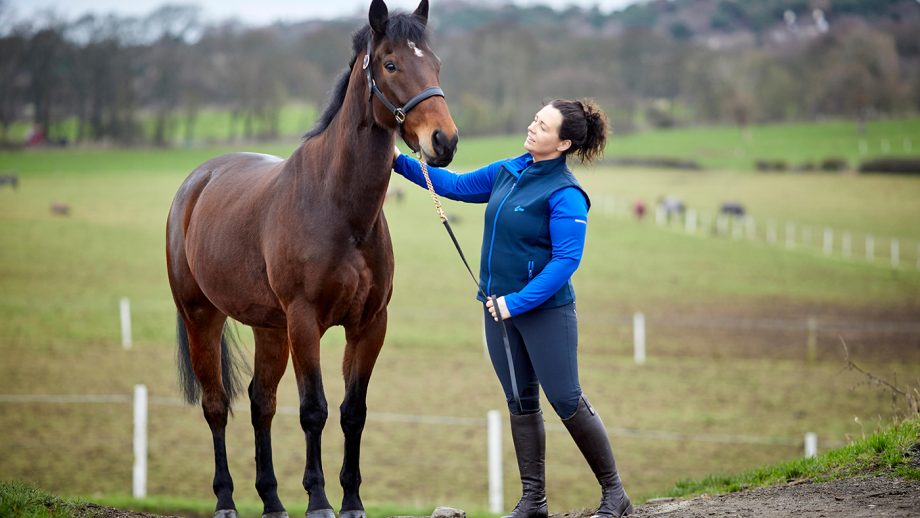Research has shown that vets are at a greater risk than the average population of some mental health issues and suicide. H&H speaks to members of the profession about demand, client expectations and social media backlash
MENTAL health in the veterinary industry is “getting worse” as depression and suicide remain major concerns, and issues such as higher expectations, increased demands and social media backlash contributing to stress.
Previous studies have highlighted mental health concerns, showing that vets are at higher risk of serious psychological distress and suicide, while new research by the British Veterinary Association found 74% of 565 respondents were “very or quite concerned” about stress and burnout as a result of Covid.
{"content":"PHA+QnJpdGlzaCBFcXVpbmUgVmV0ZXJpbmFyeSBBc3NvY2lhdGlvbiAoQkVWQSkgcHJlc2lkZW50IEx1Y3kgR3JpZXZlIHRvbGQgPGVtPkgmYW1wO0ggPC9lbT5tZW50YWwgaGVhbHRoIGNvbmNlcm5zIGFtb25nIHZldHMgYXJlIGluY3JlYXNpbmcgYW5kIHNhaWQgdGhlIHRvcGljIG9mIHN1aWNpZGUgaGFzIGJlZW4gbXVjaCBjb25zaWRlcmVkIGZvbGxvd2luZyB0aGUgcmVzZWFyY2guPC9wPgo8cD7igJxJdOKAmXMgYmVlbiBjaXRlZCB0aGF0IGFzIHdlIGFyZSBleHBlY3RlZCB0byBkZWFsIHdpdGggZGVhdGggcmVndWxhcmx5LCB3aXRoIGV1dGhhbmlzaW5nIGFuaW1hbHMgYmVpbmcgYSB1bmlxdWUgd2F5IG9mIGhhdmluZyB0byBkZWFsIHdpdGggZGVhdGgsIHdl4oCZcmUgcXVpdGUgZmFtaWxpYXIgd2l0aCBpdCBhbmQgc29tZSBoYXZlIGFyZ3VlZCBzdWljaWRlIGJlY29tZXMgYW4gZWFzaWVyIG9wdGlvbiBhcyBhIHJlc3VsdCzigJ0gc2hlIHNhaWQuPC9wPgo8cD7igJxUaGF0IHNvdW5kcyByYXcsIGJ1dCB0aGUgY29uY2VwdCBvZiBldXRoYW5hc2lhIGlzIHBhcnQgb2Ygb3VyIGpvYiBzbyBvbmUgY291bGQgYXJndWUgaXTigJlzIG5vdCB0b28gYmlnIGEgc3RlcCBpZiB5b3XigJlyZSBpbiBhIHZlcnkgZGFyayBwbGFjZS7igJ08L3A+CjxwPjxkaXYgY2xhc3M9ImFkLWNvbnRhaW5lciBhZC1jb250YWluZXItLW1vYmlsZSI+PGRpdiBpZD0icG9zdC1pbmxpbmUtMiIgY2xhc3M9ImlwYy1hZHZlcnQiPjwvZGl2PjwvZGl2PjxzZWN0aW9uIGlkPSJlbWJlZF9jb2RlLTMxIiBjbGFzcz0iaGlkZGVuLW1kIGhpZGRlbi1sZyBzLWNvbnRhaW5lciBzdGlja3ktYW5jaG9yIGhpZGUtd2lkZ2V0LXRpdGxlIHdpZGdldF9lbWJlZF9jb2RlIHByZW1pdW1faW5saW5lXzIiPjxzZWN0aW9uIGNsYXNzPSJzLWNvbnRhaW5lciBsaXN0aW5nLS1zaW5nbGUgbGlzdGluZy0tc2luZ2xlLXNoYXJldGhyb3VnaCBpbWFnZS1hc3BlY3QtbGFuZHNjYXBlIGRlZmF1bHQgc2hhcmV0aHJvdWdoLWFkIHNoYXJldGhyb3VnaC1hZC1oaWRkZW4iPg0KICA8ZGl2IGNsYXNzPSJzLWNvbnRhaW5lcl9faW5uZXIiPg0KICAgIDx1bD4NCiAgICAgIDxsaSBpZD0ibmF0aXZlLWNvbnRlbnQtbW9iaWxlIiBjbGFzcz0ibGlzdGluZy1pdGVtIj4NCiAgICAgIDwvbGk+DQogICAgPC91bD4NCiAgPC9kaXY+DQo8L3NlY3Rpb24+PC9zZWN0aW9uPjwvcD4KPHA+TXJzIEdyaWV2ZSBhZGRlZCB0aGF0IG1lbnRhbCBoZWFsdGggaXNzdWVzIGluIHRoZSBpbmR1c3RyeSBhcmUg4oCcbXVsdGlmYWN0b3JpYWzigJ0gYnV0IHNhaWQgc3RyZXNzIGlzIG9uZSBvZiB0aGUgYmlnZ2VzdCBwcm9ibGVtcywgYXMgaXMgYmVpbmcgdW5hYmxlIHRvIOKAnHN3aXRjaCBvZmbigJ0uPC9wPgo8cD7igJxPZnRlbiBpZiBzb21ldGhpbmcgcG9wcyBpbnRvIGEgY2xpZW504oCZcyBoZWFkIGF0IDhwbSB0aGV5IG1lc3NhZ2UgeW91IHRoZW4uIEnigJltIG5vdCBjcml0aWNpc2luZyBvd25lcnMsIGJ1dCBub3QgZXhwZWN0aW5nIGEgcmVzcG9uc2UgdW50aWwgdGhlIG5leHQgZGF5IGlzIGJldHRlcizigJ0gc2hlIHNhaWQuPC9wPgo8cD7igJxJdCBjYW4gc3VidGx5IGNoaXAgYXdheSBhdCB5b3UgaWYgaW4geW91ciBzcGFyZSB0aW1lIHlvdeKAmXJlIGdldHRpbmcgYm9tYmFyZGVkIHdpdGggbWVzc2FnZXMuIEJ1dCB3ZeKAmXJlIHJlc3BvbnNpYmxlIGZvciBvdXIgb3duIGJvdW5kYXJpZXMgc28gdmV0cyBzaG91bGQgZXF1YWxseSBzYXkg4oCYSeKAmWxsIGdldCBiYWNrIHRvIHlvdSB0b21vcnJvdyzigJkgb3Igbm90IHJlcGx5IHVudGlsIHRoZSBuZXh0IGRheS7igJ08L3A+CjxkaXYgY2xhc3M9ImFkLWNvbnRhaW5lciBhZC1jb250YWluZXItLW1vYmlsZSI+PGRpdiBpZD0icG9zdC1pbmxpbmUtMyIgY2xhc3M9ImlwYy1hZHZlcnQiPjwvZGl2PjwvZGl2Pgo8cD5NcnMgR3JpZXZlIHNhaWQgY2xpZW50c+KAmSBleHBlY3RhdGlvbnMgb24gZmVlcyBjYW4gbWVhbiB0aGV5IHdhbnQgdGhlIGJlc3Qgc2VydmljZSwgYnV0IGFyZSBub3QgY29tZm9ydGFibGUgd2l0aCB0aGUgY29zdC48L3A+CjxwPuKAnFdlaWdoaW5nIHVwIHRoZSBhbmltYWzigJlzIG5lZWRzIHdpdGggd2hhdCB0aGUgY2xpZW50IGlzIHdpbGxpbmcgdG8gcGF5IGlzIHdoZXJlIGEgbG90IG9mIHN0cmVzcyBlbnRlcnMuIFlvdeKAmXJlIHRyeWluZyB0byBkbyB5b3VyIGJlc3Qgd2l0aCBsaW1pdGF0aW9ucywgYW5kIHRoYXTigJlzIGhhcmQs4oCdIHNoZSBzYWlkLjwvcD4KPGRpdiBjbGFzcz0iYWQtY29udGFpbmVyIGFkLWNvbnRhaW5lci0tbW9iaWxlIj48ZGl2IGlkPSJwb3N0LWlubGluZS00IiBjbGFzcz0iaXBjLWFkdmVydCI+PC9kaXY+PC9kaXY+CjxwPk1CTSBWZXRlcmluYXJ5IEdyb3VwIGVxdWluZSB2ZXQgU3RlcGhhbmllIFdhbGtlciB0b2xkIDxlbT5IJmFtcDtIPC9lbT4gc2hlIHdhcyBhd2FyZSBvZiBtZW50YWwgaGVhbHRoIGNvbmNlcm5zIGluIHRoZSBpbmR1c3RyeSBidXQgZGlkIG5vdCBrbm93IGhvdyBiYWQgdGhlIHByb2JsZW0gd2FzIHVudGlsIHNoZSBncmFkdWF0ZWQuPC9wPgo8cD7igJxJIHdlbnQgaW50byB2ZXQgc2Nob29sIHdpdGggdGhlIG1pbmRzZXQgdGhhdCBpdOKAmXMgZ29pbmcgdG8gYmUgYSB0b3VnaCBqb2IgYW5kIEkgbmVlZCB0byB3b3JrIGhhcmQsIGJ1dCBvbiBncmFkdWF0aW5nIGluIDIwMTgsIEkgcmVhbGlzZWQgaXTigJlzIHRoZSBtZW50YWwgY2FwYWNpdHkgYW5kIGVtb3Rpb25zIHRoYXQgYXJlIGhhcmQgdG8gZGVhbCB3aXRoLCBldmVuIHdoZW4geW91IGZpbmlzaCBmb3IgdGhlIGRheSzigJ0gc2hlIHNhaWQsIGFkZGluZyB0aGF0IHRoZSBpc3N1ZXMgY2FuIGFmZmVjdCBvZmZpY2Ugc3RhZmYgYW5kIG51cnNlcyB0b28uPC9wPgo8ZGl2IGNsYXNzPSJhZC1jb250YWluZXIgYWQtY29udGFpbmVyLS1tb2JpbGUiPjxkaXYgaWQ9InBvc3QtaW5saW5lLTUiIGNsYXNzPSJpcGMtYWR2ZXJ0Ij48L2Rpdj48L2Rpdj4KPHA+RHIgV2Fsa2VyIHNhaWQgc3VpY2lkZSByYXRlcyBpbiB0aGUgaW5kdXN0cnkgYXJlIOKAnG5vdCBnZXR0aW5nIGFueSBsb3dlcuKAnSwgYWRkaW5nIHRoYXQgc2hlIGtuZXcgcGVvcGxlIHdobyBoYWQgdGFrZW4gdGhlaXIgbGl2ZXMuPC9wPgo8cD7igJxBbnkgdmV0IHdpbGwga25vdyBvciBrbm93IG9mIHNvbWVvbmUgd2hvIGhhcyBjb21taXR0ZWQgc3VpY2lkZTsgSSBkb27igJl0IHRoaW5rIGVub3VnaCBwZW9wbGUga25vdyB0aGF0LOKAnSBzaGUgc2FpZC4g4oCcSXTigJlzIG5vdCB0byBzYXkgdGhlcmUgYXJlbuKAmXQgdW5kZXJseWluZyBwZXJzb25hbCBjaXJjdW1zdGFuY2VzIGJ1dCB0aGUgam9iIGNlcnRhaW5seSBoYXMgY29udHJpYnV0ZWQuIEl04oCZcyBoZWFydGJyZWFraW5nLuKAnTwvcD4KPHA+RHIgV2Fsa2VyIHNhaWQgYmVpbmcgYSB2ZXQgb2Z0ZW4g4oCcZGVtYW5kcyBwZXJmZWN0aW9u4oCdLCBhbmQgYWdyZWVkIGNsaWVudCBleHBlY3RhdGlvbnMgYXJvdW5kIGNvc3RzIGNhbiBhZGQgdG8gc3RyZXNzLjwvcD4KPHA+4oCcWW914oCZdmUgZ290IHBlb3BsZeKAmXMgcGV0c+KAmSBsaXZlcyBhdCBzdGFrZSBhbmQgdGhhdCBpbiBpdHNlbGYgaXMgcXVpdGUgc3RyZXNzZnVsLiBJdOKAmXMgYSB2ZXJ5IGNhcmluZyBwcm9mZXNzaW9uIGFuZCBJIHRoaW5rIHRoYXTigJlzIHdoZXJlIGEgbG90IG9mIGRlcHJlc3Npb24gY2FuIGNvbWUgZnJvbSwgYnkgYWxtb3N0IGNhcmluZyB0b28gbXVjaCzigJ0gc2hlIHNhaWQuPC9wPgo8cD7igJxJ4oCZdmUgYmVlbiB0b2xkIOKAmFlvdeKAmWQgZG8gdGhpcyBmb3IgZnJlZSBpZiB5b3UgY2FyZWTigJkg4oCTIGl04oCZcyBub3QgdGhhdCB3ZSBkb27igJl0IGNhcmUsIGJ1dCB0aGVyZeKAmXMgbm8gTkhTIGZvciBob3JzZXMuIFdpdGggQ292aWQgZXNwZWNpYWxseSwgY2xpZW50cyBhcmUgdW5kZXIgc28gbXVjaCBzdHJlc3M7IHdlIGFsbCBhcmUuIENsaWVudHMgaGF2ZSBhIGxvdCBnb2luZyBvbiB0aGF0IHdlIGRvbuKAmXQgc2VlIGJ1dCBJIGhvcGUgdGhleSBtaWdodCBiZSB0aGUgc2FtZSB3aXRoIHVzOyBpdOKAmXMgYSB0d28td2F5IHN0cmVldC4gWW91IG1pZ2h0IGhhdmUgYmVlbiB0byBldXRoYW5pc2UgYW4gYW5pbWFsLCB0aGVuIHRoZSBuZXh0IGNsaWVudCBpcyB1bmhhcHB5IHlvdeKAmXJlIGxhdGUgYW5kIGlzbuKAmXQgYXMga2luZCBhcyB0aGV5IGNvdWxkIGJlLiBJdOKAmXMgdGhlIGhpZ2ggZXhwZWN0YXRpb25zIHRoYXQgYXJlIHNvbWV0aW1lcyBkaWZmaWN1bHQu4oCdPC9wPgo8cD5JVkMgZXF1aW5lIGdyb3VwIHZldGVyaW5hcnkgYWR2aXNvciBHcmFoYW0gSHVudGVyIGFncmVlZCBtZW50YWwgaGVhbHRoIGlzIGEg4oCcaHVnZSBpc3N1ZeKAnSBpbiB0aGUgaW5kdXN0cnksIGFuZCBzYWlkIGZhY3RvcnMgaW5jbHVkaW5nIGhvdyB0aGUgam9iIGhhcyBjaGFuZ2VkLCBjbGllbnQgZGVtYW5kcyBhbmQgaGlnaCBleHBlY3RhdGlvbnMgaGF2ZSBoYWQgYW4gaW1wYWN0LjwvcD4KPHA+4oCcQmVmb3JlLCB0aGUgYXR0aXR1ZGUgdG8gbWVudGFsIGhlYWx0aCB3YXMg4oCYYnVjayB1cOKAmSBidXQgbm93IGl04oCZcyB2ZXJ5IGhpZ2hsaWdodGVkLOKAnSBoZSBzYWlkLiDigJxWZXRzIGFyZSBvZnRlbiB3b3JraW5nIGFsb25lLCBpbiB0aGUgbWlkZGxlIG9mIHRoZSBuaWdodCwgYW5kIHRoZXNlIGFyZSBodWdlIHByZXNzdXJlcy4gSWYgeW914oCZcmUgc2Vuc2l0aXZlLCBhbmQgb3V0IGluIHRoaXMgd29ybGQgd2hlcmUgcGVvcGxlIGNhbiBiZSBicnV0YWwsIHlvdSBjYW4gc2VlIHdoeSBwZW9wbGUgc29tZXRpbWVzIHN0cnVnZ2xlLjwvcD4KPHA+4oCcVHdlbnR5IHllYXJzIGFnbyBwZW9wbGUgd2VyZSBoYXBweSB0aGF0IHlvdSBoYWQgZG9uZSB5b3VyIGJlc3Qgd2hlcmVhcyBub3cgbGl0aWdhdGlvbiBhZ2FpbnN0IHZldHMgaXMgdmVyeSBoaWdoLiBDbGllbnRzIHdhbnQgdXMgdG8gYmUgaG9uZXN0LCBraW5kIGFuZCBsaXN0ZW4sIGFuZCB0aGF04oCZcyB0aGUgYmFzaXMgb2YgYmVpbmcgYSBnb29kIHZldCDigJMgYnV0IHRoZSBkb3duc2lkZSBpcyB5b3XigJlyZSB0aHJvd24gaW50byBzdHJlc3NmdWwgc2l0dWF0aW9ucy7igJ08L3A+CjxoMz5QZXJzcGVjdGl2ZTwvaDM+CjxwPkRSIEhVTlRFUiBiZWxpZXZlcyB0aGUgaW5kdXN0cnkgaXMgZG9pbmcg4oCcYXMgbXVjaCBhcyBpdCBjYW7igJ0gd2l0aCBzdXBwb3J0IGZvciB2ZXRzIGJ1dCBzYWlkIGl0IHdvdWxkIGJlIGhlbHBmdWwgaWYgdmV0IHNjaG9vbHMgaW5jbHVkZWQgbW9yZSBvbiBkZWFsaW5nIHdpdGggY29tcGxhaW50cyBhbmQgZGlmZmljdWx0IGNsaWVudHMuPC9wPgo8cD7igJxJZiB2ZXRzIGNhbiBsZWFybiBmcm9tIGhvdyB0byBwdXQgdGhpbmdzIGludG8gcGVyc3BlY3RpdmUgYW5kIG5vdCB0YWtlIHRoaW5ncyB0byBoZWFydCBhbmQgd29ycnksIGl0IHdpbGwgaGVscCzigJ0gaGUgc2FpZC48L3A+CjxwPkhhd2tlZG9uIFZldGVyaW5hcnkgU3VyZ2VyeSBlcXVpbmUgZGlyZWN0b3IgTG9ybmEgQnJva2Vuc2hpcmUtRHlrZSB0b2xkIDxlbT5IJmFtcDtIPC9lbT4gYW1vbmcgdGhlIGlzc3VlcyBhZmZlY3RpbmcgbWVudGFsIGhlYWx0aCBhcmUgcHVibGljIHBlcmNlcHRpb24gYW5kIHNvY2lhbCBtZWRpYSBwb3N0cyBhY2N1c2luZyB2ZXRzIG9mIOKAnGV4dG9ydGlvbuKAnSBvdmVyIGZlZXMuPC9wPgo8cD7igJxXaGVuIHlvdSBzZWUgcG9zdHMgaXTigJlzIGp1c3QgYW5vdGhlciBuYWlsIGluIHRoZSBjb2ZmaW4gYW5kIGl04oCZcyBkaXNoZWFydGVuaW5nLOKAnSBzaGUgc2FpZC48L3A+CjxwPuKAnFlvdSB0aGluaywg4oCYSXMgdGhpcyByZWFsbHkgdGhlIHBlcmNlcHRpb24gb2Ygd2hhdCB3ZSBkbywgdGhhdCB3ZeKAmXJlIG1vbmV5LWdyYWJiaW5nIGFuZCBub3QgaW4gaXQgZm9yIHRoZSBhbmltYWxzP+KAmSBXZeKAmXJlIGh1bWFucyB3aG8gZmVlbCBqdXN0IGxpa2UgYW55Ym9keSBlbHNlIOKAkyB5b3XigJlkIGhhdmUgdG8gYmUgcHJldHR5IGltbXVuZSB0byBub3QgbGV0IHNvbWUgb2YgdGhlIGNvbW1lbnRzIGFmZmVjdCB5b3UuIE5vYm9keSBpcyBhYm92ZSBjcml0aWNpc20sIGJ1dCBpdOKAmXMgYWJvdXQgY29uc3RydWN0aXZlIGNyaXRpY2lzbS48L3A+CjxkaXYgY2xhc3M9ImluamVjdGlvbiI+PC9kaXY+CjxwPuKAnE5vdCBldmVyeWJvZHkgaGFzIGEgdGhpY2sgc2tpbiBhbmQgd2h5IHNob3VsZCB5b3U\/IEFueW9uZSBpcyBhdCByaXNrIG9mIG1lbnRhbCBoZWFsdGggcHJvYmxlbXM7IG5vIG9uZSBpcyBpbW11bmUgYW5kIG5vdyB3ZeKAmXJlIG1vcmUgb3Blbiwgd2XigJlyZSBkaXNjb3ZlcmluZyB0aGF0LiBGb3IgdGhlIHByb2Zlc3Npb24gdG8gYmUgc28gZmFyIGFib3ZlIG90aGVycyB3aXRoIG1lbnRhbCBoZWFsdGggaXNzdWVzIGFuZCBzdWljaWRlIGlzIGEgcHJldHR5IGRlc3BlcmF0ZSBwbGFjZSwgcGFydGljdWxhcmx5IGJlY2F1c2Ugd2XigJlyZSBhIGNhcmluZyBwcm9mZXNzaW9uIOKAkyB3ZSBhbGwgd2VudCBpbnRvIGl0IHRvIGhlbHAu4oCdPC9wPgo8cD5TdXBwb3J0IGlzIGF2YWlsYWJsZSBmb3IgdmV0cyBmcm9tIHRoZSBSb3lhbCBDb2xsZWdlIG9mIFZldGVyaW5hcnkgU3VyZ2VvbnMgTWluZCBNYXR0ZXJzIEluaXRpYXRpdmUsIHdoaWNoIGxhc3QgbW9udGggbGF1bmNoZWQgYSBmaWxtIHdpdGggQkVWQSByYWlzaW5nIGF3YXJlbmVzcyBvZiB3ZWxsYmVpbmcgY2hhbGxlbmdlcyBmYWNlZCBieSB2ZXRzLiBUaGVyZSBpcyBhbHNvIGNoYXJpdHkgVmV0bGlmZSwgYW5kIHRoZSBWZXRlcmluYXJ5IERlZmVuY2UgQXNzb2NpYXRpb24sIHdoaWNoIHByb3ZpZGVzIGxlZ2FsIGFkdmljZS48L3A+CjxwPgo="}
Buying a horse can be a tricky process but it is possible to find your ideal partner.
Credit: Alamy Stock Photo
The Fall tackles the subject that athletes can suffer in silence from mental health issues, often feeling the need to
Library image.
Credit: Bill Selwyn
‘He was my best friend, my everything’
Library image.
Credit: Alamy Stock Photo
As national anti-bullying week comes to a close, more needs to be done to combat the problem across the equestrian
Stay in touch with all the news in the run-up to and throughout the major shows and events during 2025 and beyond with a Horse & Hound subscription. Subscribe today for all you need to know ahead of these major events, plus online reports on the action as it happens from our expert team of reporters and in-depth analysis in our special commemorative magazines. Have a subscription already? Set up your unlimited website access now
H&H senior news writer
Since joining H&H in 2018, Becky has covered a broad range of equestrian news including welfare matters, veterinary studies, FEI Tribunal hearings and road safety campaigns. She has also interviewed top riders including Scott Brash, John Whitaker and Ian Stark, to name just a few. Becky’s reporting has taken her to Canada for Spruce Meadows and France for Pau five-star, as well as the Royal Highland and Blair Castle International Horse Trials closer to home. She was also a key part of the remote reporting team for the Tokyo Olympics and the Europeans.






